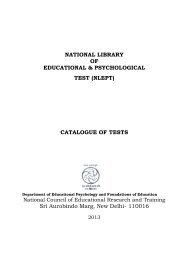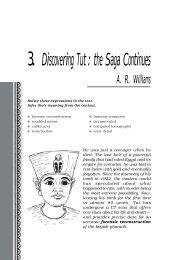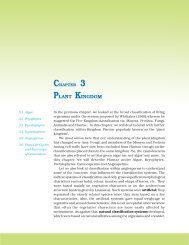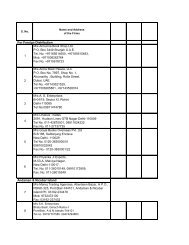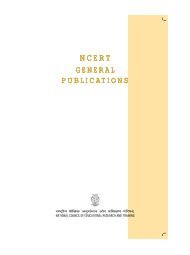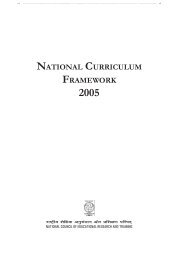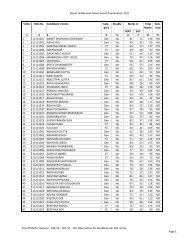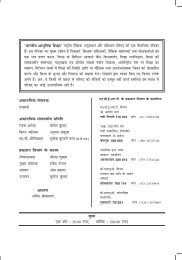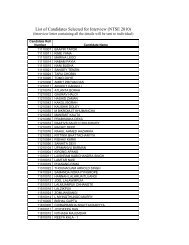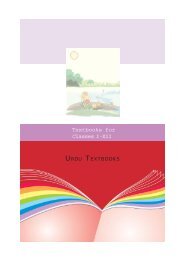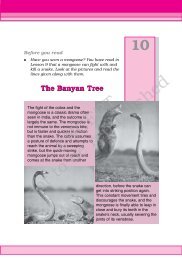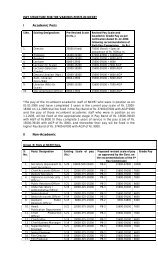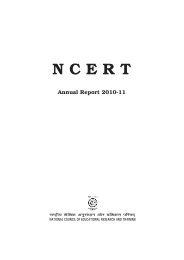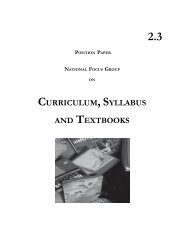indian education - National Council Of Educational Research And ...
indian education - National Council Of Educational Research And ...
indian education - National Council Of Educational Research And ...
You also want an ePaper? Increase the reach of your titles
YUMPU automatically turns print PDFs into web optimized ePapers that Google loves.
The Aims of Education 13<br />
have learnt through participation in the<br />
practices of our communities. In different<br />
communities, the practices and<br />
traditions vary widely.<br />
The term tradition may be interpreted<br />
in many ways. In its barest sense, it<br />
means that which is handed down or<br />
transmitted from generation to<br />
generation in a community because it<br />
consists of devices and principles that<br />
have helped the community to make<br />
sense of its experiences and activities.<br />
Perhaps, it was for this reason that<br />
Wittgenstein had rightly remarked,<br />
“tradition is not………a thread he (man) can<br />
pick up when he feels like it any more<br />
than a man can choose his own<br />
ancestors.” 4<br />
Education as a planned endeavour,<br />
at a personal level on a small scale or<br />
institutional level on a large scale, aims<br />
at making children capable of becoming<br />
active, responsible, productive, and<br />
caring members of society. They are<br />
made familiar with the various practices<br />
of the community by imparting the<br />
relevant of skills and ideas. Ideally,<br />
<strong>education</strong> is supposed to encourage the<br />
students to analyse and evaluate their<br />
experiences, to doubt, to question, to<br />
investigate – in other words, to be<br />
inquisitive and to think independently.<br />
As we grow, we face new and<br />
unfamiliar experiences which question<br />
our old ways of thinking as these<br />
4 Wittgenstein, Ludwig 1973. Culture and Value, Blackwell. P.76.<br />
experiences are either inconsistent with<br />
or at a considerable variance from what<br />
we had gradually learnt to take for<br />
granted. Such experiences are critical<br />
and challenging as they involve or require<br />
formulation of new concepts, revision of<br />
preconceived notions, and new ways of<br />
looking at and dealing with the world. It<br />
is this unique human ability that is<br />
called rationality, which is manifested in<br />
human behaviour in a wide variety of<br />
ways.<br />
Our attempts to make sense of our<br />
experiences, to comprehend the world<br />
that we live in, require that we recognise<br />
patterns, structures, and order in the<br />
world. Without such recognition, we<br />
would not be able to make any<br />
judgements; we could not be in a position<br />
to be certain about anything. This quest<br />
for certainty, taken to its extreme, may<br />
become a demand for a monistic and<br />
absolute criterion by which it would be<br />
possible to draw sharp lines between the<br />
rational and the irrational, knowledge<br />
and a lack of it. In becoming captives of<br />
such a restricting vision, we forget<br />
that there are numerous ways in which<br />
we learnt to know and to reason about<br />
the world. This forgetting leads us to<br />
reduce rationality to mere formulas of<br />
deductive reasoning, placing greater<br />
value on theory over practice, natural<br />
sciences over art, and information over<br />
knowledge.



